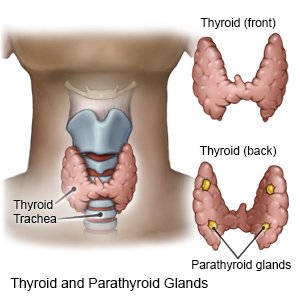Graves Disease
Medically reviewed by Drugs.com. Last updated on Aug 4, 2025.
Graves disease is an autoimmune disease that causes your immune system to attack your thyroid gland. This causes your body to make too much thyroid hormone and leads to hyperthyroidism. The thyroid gland is a butterfly-shaped organ that is found in the front part of your neck. Thyroid hormones regulate body temperature, heart rate, and weight.
 |
WHILE YOU ARE HERE:
Informed consent
is a legal document that explains the tests, treatments, or procedures that you may need. Informed consent means you understand what will be done and can make decisions about what you want. You give your permission when you sign the consent form. You can have someone sign this form for you if you are not able to sign it. You have the right to understand your medical care in words you know. Before you sign the consent form, understand the risks and benefits of what will be done. Make sure all your questions are answered.
You may need extra oxygen
if your blood oxygen level is lower than it should be. You may get oxygen through a mask placed over your nose and mouth or through small tubes placed in your nostrils. Ask your healthcare provider before you take off the mask or oxygen tubing.
A heart monitor
is an EKG that stays on continuously to record your heart's electrical activity.
Medicine:
- Antithyroid medicines decrease thyroid hormone levels and your symptoms.
- Heart medicine may be given to control and regulate your heart rate.
Tests:
- Blood tests will be done to measure your thyroid levels. They may also be done to check for antibodies that show you may have Graves disease.
- Radioactive iodine uptake tests may be done to show how well your thyroid works. It may show that your thyroid gland is producing too much hormone.
- A thyroid scan may be done to show the size, shape, and position of your thyroid. A small amount of radioactive tracer is given to create pictures of your thyroid.
Treatment:
- IV fluids may be given through a tube that is placed in your vein.
- Radioactive iodine is given to damage or kill some thyroid gland cells. This may decrease the amount of thyroid hormone produced. Tell your healthcare provider if you are breastfeeding, or you know or think you are pregnant. This medicine can be harmful to your baby.
- Surgery may be done to remove all or part of the thyroid gland.
RISKS:
Thyroid storm is a sudden, severe increase in your thyroid hormone levels. A thyroid storm can happen if you have untreated hyperthyroidism. A thyroid storm can be triggered by an infection, a serious injury, or surgery. A thyroid storm can cause a fever, fast heartbeat, increased sweating, vomiting, diarrhea, and trouble thinking. You may have seizures or go into a coma. A thyroid storm can be life-threatening.
CARE AGREEMENT:
You have the right to help plan your care. Learn about your health condition and how it may be treated. Discuss treatment options with your healthcare providers to decide what care you want to receive. You always have the right to refuse treatment.© Copyright Merative 2025 Information is for End User's use only and may not be sold, redistributed or otherwise used for commercial purposes.
The above information is an educational aid only. It is not intended as medical advice for individual conditions or treatments. Talk to your doctor, nurse or pharmacist before following any medical regimen to see if it is safe and effective for you.
Further information
Always consult your healthcare provider to ensure the information displayed on this page applies to your personal circumstances.
